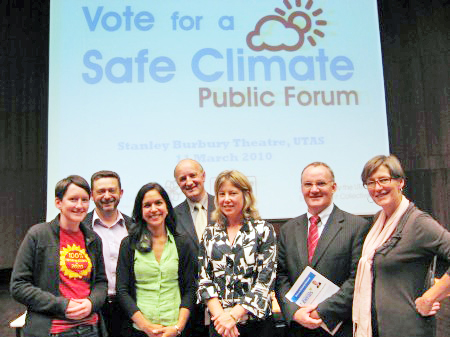Tasmanian politicians are still trying to come to grips with how to tackle climate change. Four party representatives have shown that that we might be able to find common cause and start to act coherently — if only party hacks could get out of the way. [16 March 2010 | Peter Boyer]

At the Safe Climate forum: party representatives Mel Barnes, Lisa Singh, Vanessa Goodwin and Cassy O'Connor with Climate Action Hobart members (l to r) Phil Harrrington, Peter Boyer and Richard Wilson. PHOTO GEMMA TILLACK
Here’s one for the history books. Let it be known that last week, for the first time in Tasmania, leading representatives of all major parties fronted at a public meeting to discuss climate policy, and even seemed to enjoy the experience.
As did the audience at Thursday’s “Vote for a Safe Climate” forum in Hobart, which engaged in a long, spirited conversation with speakers about how Tasmania should respond to the climate crisis.
This was a time to treasure. For a fleeting couple of hours, we saw how capable, intelligent, committed parliamentarians and political candidates, in front of an engaged public audience, are capable of finding common purpose when the need arises.
The policy presentations differed in detail, and we heard bits of the usual inter-party banter (Labor versus Liberal, Greens versus everyone), but the overwhelming impression was one of fundamental accord on this all-encompassing policy challenge.
While the most detailed and progressive climate policies came from Cassy O’Connor (Greens) and Mel Barnes (Socialist Alliance), Labor’s Lisa Singh and Vanessa Goodwin (Liberals) each showed they understood the pressing need to address carbon and energy issues and felt a personal commitment to act on it.
Let’s not get carried away. The first thing to be said is that these people represent political parties, and no party — no organisation of any kind — has come up with the right set of policies to beat climate change, because they haven’t been able to get their heads around the nature and extent of the threat.
The more environmentally-focused Greens and the minnows of the pack, the Socialist Alliance, have some imaginative ideas for improving energy efficiency, take-up of public and low-carbon transport, boosting deployment and take-up of renewable energy, encouraging a shift to low-carbon workplaces, and eliminating waste.
In particular, the Greens are strong on ways to foster local production and make consumption more sustainable, and the Socialist Alliance on how people can become better informed about climate change and more capable of dealing with it.
But the Socialist Alliance is very much a minor contender, and while the Greens are knocking on the door of political power, their only hope of getting through it, at least for now, is to join with one of the two “establishment” parties. So the main attention of the forum was focused on what Labor and Liberal could come up with in the way of a climate policy.
In the lead-up to the forum, Climate Action Hobart assessed the parties’ policies as they stood at a pre-determined deadline in the middle of last week, measured against the group’s list of ten strategies for a safer climate.
The assessment found both Labor and Liberal policies seriously lacking in either commitment or detailed information, heading in the wrong direction on forest carbon and strong planning laws, and very deficient or absent altogether on energy efficiency, renewable energy, transition to a low-carbon future, production and consumption measures, and climate education and justice.
Of the two, the Liberal policy came off worse, achieving a “good start” assessment only on its transport measures. But Labor couldn’t claim much advantage, achieving a bare pass mark in only three of ten categories.
Both parties, it seemed, had a long way to go. Singh and Goodwin knew they would be facing a tough inquisition at the forum, and came prepared with some additional policy measures.
The Labour government can claim some credit for starting up the process of tackling carbon emissions and improving energy efficiency. Its audit of government activities, legislated 2050 emissions target, “climate connect” community grants program and “wedges” analysis of broader emissions cuts are significant first steps in what will be a long and difficult process.
Lisa Singh reported among other commitments a $2.5 million spend on renewable energy and a target of 100 percent renewable energy by 2030, building climate change factors into its procurement guidelines and specifying minimum energy standards for new government buildings.
For her part, Goodwin said the Liberals would support public and private renewable energy schemes and marketing of local food, ban plastic shopping bags, offer practical water-saving incentives and free school bus services, and establish a stand-alone environment department.
Significantly, Goodwin announced that a Liberal government would invest in a public-private partnership to build a biochar plant in Tasmania, in which charcoal is produced from waste biomass in an oxygen-free combustion process to serve both as a carbon store and as slow-release fertiliser for plants. The question remains as to where the bio-waste will come from, but it’s a positive step.
The Liberal Opposition has been very quiet on the climate crisis, perhaps a reflection of the known “climate agnostic” views of Eric Abetz and his Liberal Senate colleagues. But in response to a question Vanessa Goodwin asserted that the Liberals in the Tasmanian parliament took their own, independent counsel on such matters, implying a separation from the Abetz position.
The generally positive tone of the forum was a far cry from the fractious public posturing of the parties. Singh, Goodwin and O’Connor treated each other with respect and responded thoughtfully to audience questions, which gave rise to one questioner suggesting that all parties might agree to cooperate on climate change measures.
This is an idea whose time has come. All it needs is party leaders who allow it to happen.
• Click here for updated information on the parties’ climate policies.
